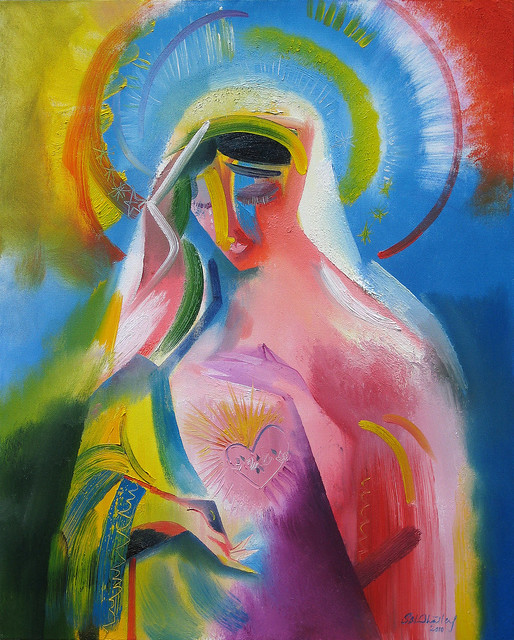In the preamble of his apostolic letter
Rosarium Virginis Mariae, St. John Paul II spoke of the practice of the recitation of the Rosary as a Christocentric prayer, in light of the reflection in all but 2 episodes of the life of Incarnate Word. In the words of the preamble the Rosary, rightly prayed, therefore, should be a "compendium" of the Gospel which has "all the depth of the Gospel message in its entirety, and should lead one to "contemplate the beauty on the face of Christ and to experience the depths of his love".
Be that as it may, John Paul notes, the Christocentrism of the Rosary is coupled with the observation that those reciting this prayer contemplate the Gospel as they "sit in the school of Mary". The reason for this, John Paul says in paragraph 11, is because,
Mary lived with her eyes fixed on Christ, treasuring his every word: “She kept all these things, pondering them in her heart” (Lk 2:19; cf. 2:51). The memories of Jesus, impressed upon her heart, were always with her, leading her to reflect on the various moments of her life at her Son's side
The recitation of the Rosary, therefore, is thus an act of seeing Christ through the eyes of another that never leaves him. In many respects, this posture of prayer has highly significant theological, political and ethical imperatives. Whilst this post will not be able to exhaustively spell out the content of these imperatives, it is interesting that a lot of its vocabulary can be drawn from a branch of feminism known as standpoint feminism, the main exponents of which include Sandra Harding and Nancy Hartstock. To the notion that the Rosary is the prayer to Christ from the standpoint of Mary, there are a number of key insights that are borne from these feminists, three of which include
- The limits of Knowledge: The kind of all encompassing knowledge which is the stuff of contemporary politics (and unfortunately, seeping into forms of contemporary theology), according to standpoint feminists, will always be curtailed by situation, embodiment and culture that make up the standpoint. In the Rosary, the person is reflecting on the life of Christ from the standpoint of His mother, and the Gospels remind us (especially in the first and fifth joyful mystery), that in spite of this privileged relationship, Mary still lacked full knowledge of the unfolding of God's salvific plan, evinced by questions like "But how can this come about...?" and remarks from the Evangelist that Mary did not know what Jesus meant. Knowledge must thus be coupled with a stance of humility since, as Paul says in his letter to the Corinthians, knowledge is always going to be in part and awaiting the One that completes that knowledge.
- Knowledge & Sociality: Standpoint feminists acknowledge that there is a deeply communal component to knowledge, since the object of A knowledge of B is always going to be filtered from the experiences of B by C. For the standpoint feminist, one cannot know on one's own (a corrective against outright relativism) and in knowing things, one cannot help but be aware of those that make up the context that mediates knowledge. Whilst the Rosary is rightly a Christo-centric prayer, it is no accident that the knowledge of Christ is mediated through the life of Mary in a way no different from its mediation with the other Evangelists, demonstrating the necessity for the Communion of Saints in making Christ known to the self and to others. The ethical imperative to draw from this is that attention and care must always be given to everything around oneself, including other people, things and nature itself since, as Joseph Ratzinger once wrote in Verbum Domini, that all these things make up the Word of God by which one comes to know Christ.
- Marginalisation & Transformation: Standpoint feminists always assert that the fact that knowledge is contingent upon the worlds that mediate it will always mean that every knowledge claim is but a privileged standpoint that has marginalised others on the same topic. In Christian apologetics, part of the veracity of the Gospel comes from the fact that it emerges from a marginalised standpoint, coming out of the witness of those that societies regarded as rejects - foreigners, women and traitors. However, such a marginalisation is not a resignation to a second-class status. According to Nancy Hartstock, the fact that there are standpoints at all points the way to the possibility of alternative worlds, which form the basis of possibilities for emancipation. In the context of the Rosary, this is borne out by Mary's experience of Christ in her womb, leading out to the prophetic cries as exemplified in her Magnificat (during her visitation to Elizabeth in the second Joyful Mystery), where the mighty are cast down from their privilege, and the lowly are raised.
Labels: Benedict XVI, Church and Culture, discipleship, politics, resources
